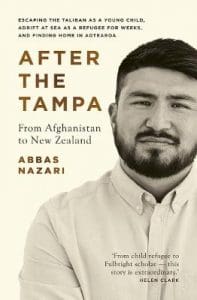Afghanistan is in the midst of a humanitarian crisis which is “off the scale” and many of its people face starvation as winter approaches, according to former New Zealand Prime Minister Helen Clark.
Helen Clark, who chairs the Global Leadership Foundation (network of former Presidents, Prime Ministers and senior government ministers who provide advice to Heads of Government), spoke via livestream at a WORD Christchurch Festival event at the Christchurch Town Hall on Friday (November 12) which showcased Afghan refugee, Fulbright Scholar and New Zealand citizen Abbas Nazari and his book After the Tampa.
In his book Nazari recalls the dangerous and courageous journey his family undertook to flee Afghanistan 20 years ago and ultimately resettle in Christchurch, New Zealand.
Nazari clan ready to roll for @WORDChCh
Awesome to be sharing #AfterTheTampa not only in my hometown, but in the very building we received our #NewZealand citizenship many years ago. pic.twitter.com/u9OV8hY59f
— Abbas Nazari???? (@theabbasnazari) November 11, 2021
Both Nazari and Clark said since the Taliban wrested back control of Afghanistan in August the economy had gone into a downward spiral and many families were struggling to feed themselves. “The situation on the ground in Afghanistan is dire. The money is beginning to become useless,” he said.
Many Afghans faced a “bleak future” under the “iron first of the Taliban” and Nazari urged New Zealanders to email or phone their local Member of Parliament and ask them what the New Zealand government was doing to help refugees from Afghanistan. In particular he called on New Zealand residents to support Afghan families in New Zealand trying to evacuate relatives at risk in Afghanistan to safety in Aotearoa.
Clark urged Kiwis to support programmes providing aid to the vulnerable in Afghanistan “otherwise people won’t make it through the winter” because the “economy was in free-fall”. She said the New Zealand government was helping to extract some refugees from Afghanistan but officials were moving with caution. Taliban intelligence operatives were meting out punishment that was “vicious” to those deemed disloyal to the regime.
Particularly at risk were the Afghans who had assisted Western forces in the last 20 years. Many had managed to leave Afghanistan but some still needed help to escape, Nazari said.
Both Clark and Nazari said the wraparound services New Zealand provided to newly arrived refugees gave them the best chance at life in their new country, particularly if the refugees had weathered difficult circumstances.
“They know someone who has been killed, tortured or detained. You have to deal with trauma, some have profound PTSD [Post-Traumatic Stress Disorder],” Clark said.
New Zealand’s welcoming approach was a contrast to Australia which refused to give the refugees aboard the container ship the Tampa safe harbour in 2001 and the then Australian Prime Minister John Howard appeared to manipulate the plight of the refugees for political gain.
Nazari said: “I have a lot of things to say to John … how glaringly wrong it was to frame the story in this way.”
Refugee resettlement was a “very divisive topic” in Australia but the rhetoric in New Zealand was “very civil and positive”, he said.
The Afghan refugees had grasped the opportunity New Zealand had offered them and proven John Howard wrong:
“We were given a chance and grabbed it with two hands, we built a life and built a community.”
Clark said many of the Afghan refugees had been very successful in business, academia and sport in New Zealand. “This was a great decision when you look at how the families settled in New Zealand. We need to see people as human beings who have hopes and dreams. When they are given a chance, they will make the most of it.”
Nazari also asked New Zealand residents to volunteer through the Red Cross and help refugees resettle in Aotearoa.
Small acts of kindness such as taking refugee children to the local park had helped cement his family’s resettlement in a positive environment. “It is easier when the country is welcoming. When people look at you with interest, not disgust,” Nazari said.
The speakers were introduced by Christchurch mayor Lianne Dalziel, who was Minister of Immigration when Nazari’s family, amongst 150 Tampa refugees, were granted asylum in New Zealand. University of Canterbury Marketing Professor Ekant Veer chaired the discussion.
WORD Christchurch
- WORD Christchurch website (for the full programme and info about authors)
- Our coverage of WORD Christchurch Festival 2021 and WORD Christchurch
- Follow WORD on Twitter, Facebook, and Instagram





Add a comment to: Former NZ leader warns of worsening humanitarian crisis in Afghanistan: Abbas Nazari and Helen Clark at WORD Christchurch Festival 2021